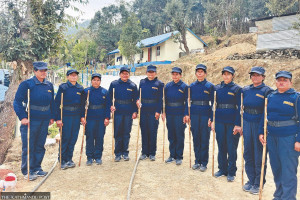Sudurpaschim Province
Unified Socialist’s Sodari appointed Sudurpaschim chief minister
Province Head Najir Miya appointed Sodari as per Article 168 (2) of the constitution.
Arjun Shah
Dirgha Sodari of the CPN (Unified Socialist) was appointed as the chief minister of Sudurpaschim Province on Thursday.
Province Head Najir Miya appointed Sodari as per Article 168 (2) of the constitution.
Earlier, the Unified Socialist leader had staked a claim to lead the new provincial government after presenting his claim for the post with the support of the CPN-UML, CPN (Maoist Centre), Nagarik Unmukti Party and an independent member.
Of the total seven lawmakers from the Nagarik Unmukti Party, only two supported Sodari while the other five, who are close to party leader Reshamlal Chaudhary, didn’t support him. The Unmukti Party has been sharply divided over whether to join hands with the UML-Maoist coalition or forge an alliance with opposition parties including Nepali Congress in the province. Party chair Ranjita Shrestha is lobbying in favour of UML-Maoist alliance while Reshamlal is for joining hands with the opposition parties. Seven members have stood in favour of Reshamlal while only two are with the party chair.
In the 53-member provincial assembly, the Maoist Centre has 11 members, the UML has 10, Nagarik Unmukti has 7 and the Unified Socialist has four members.
On Tuesday, Sudurpaschim Province Head Miya had rejected the claims by Nagarik Unmukti Party’s Kailash Kumar Chaudhary and Laxman Kishor Chaudhary.
Kailash staked a claim to lead a new provincial government with the support of the CPN-UML, the CPN (Maoist Centre) and independent lawmakers. Laxman laid his claim with the support of the Nepali Congress and the CPN (Unified Socialist).
Miya then extended the deadline till 5pm on April 18 to come up with a clear basis to obtain a majority with the backing of two or more political parties.
Earlier, Sodari’s claim had been in limbo after the UML refused to support him. With the UML leaders’ reluctance to support Sodari, Unified Socialist leaders had initiated negotiations with Nepali Congress that had given a green signal to them. Eventually, they succeeded to secure the position with the backing of the five-party alliance after UML became ready for that.




 10.17°C Kathmandu
10.17°C Kathmandu















